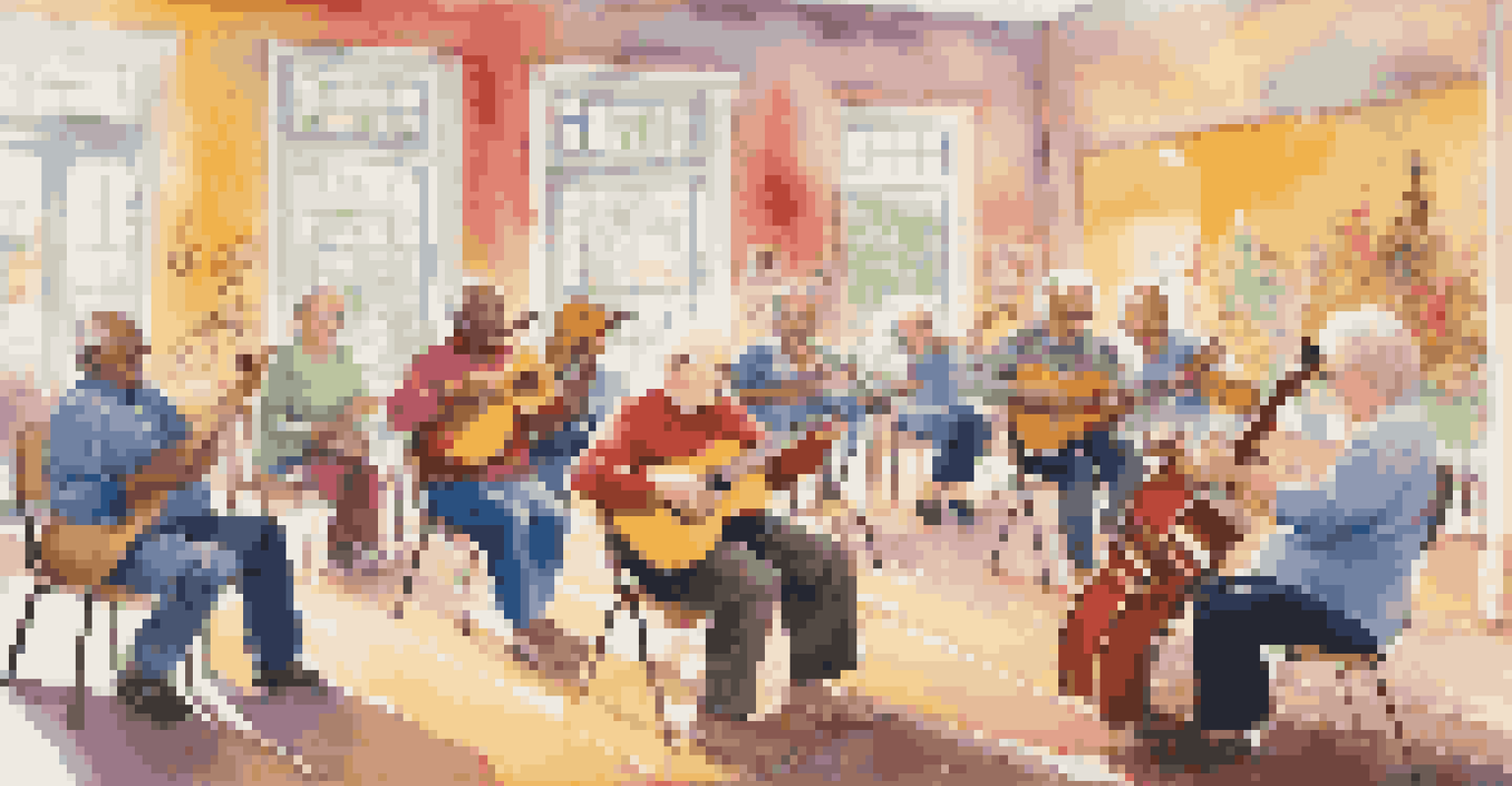The Impact of Music on Aging and Cognitive Decline Prevention

Understanding Aging and Cognitive Decline
Aging is a natural process that brings various changes to our bodies and minds. One of the most concerning aspects of aging is cognitive decline, which can affect memory, attention, and overall mental sharpness. As we age, it's common to experience challenges in processing information and recalling memories, which can impact daily life.
Music can change the world because it can change people.
Cognitive decline can be influenced by several factors, including genetics, lifestyle choices, and overall health. Research shows that maintaining an active mind and engaging in stimulating activities can help slow down this decline. Understanding how these factors interplay is crucial for developing effective prevention strategies.
As we explore the connection between music and cognitive health, it becomes clear that music can serve as a powerful tool in enhancing brain function. By incorporating music into daily routines, we might just find a way to support our mental agility as we age.
The Science Behind Music and the Brain
Music has a unique ability to activate multiple areas of the brain, making it a fascinating subject for scientists studying cognitive health. Research has shown that listening to music can stimulate brain functions related to emotion, memory, and even motor skills. This holistic engagement is why music can be so beneficial for cognitive well-being.

When we listen to or play music, our brains release dopamine, the 'feel-good' chemical, which can enhance mood and motivation. This dopamine release helps explain why music can evoke strong emotions and memories, often transporting us back to specific moments in our lives. It's this emotional connection that makes music a potent ally in combating cognitive decline.
Music Enhances Cognitive Function
Incorporating music into daily routines can significantly improve memory and cognitive health.
Additionally, studies suggest that music therapy can improve outcomes for individuals with dementia and Alzheimer's disease. By tapping into the emotional and cognitive aspects of music, patients often show improved communication skills and memory recall, highlighting the profound impact of music on brain health.
Music as a Tool for Memory Enhancement
One of the most remarkable benefits of music is its ability to enhance memory. Researchers have found that melodies and rhythms can serve as effective cues for recalling information, making music a powerful memory aid. For instance, many people remember song lyrics long after they’ve forgotten other details, showcasing music's unique role in memory retention.
Where words fail, music speaks.
This phenomenon is often utilized in educational settings where music is incorporated into learning materials. By setting information to a tune, it becomes easier for learners to grasp and remember complex concepts. This method is especially effective for older adults, who can benefit from these musical memory techniques.
Incorporating familiar songs into daily life can create a comforting environment that promotes recall and cognitive engagement. Whether it's singing along to old favorites or engaging in music-based activities, these experiences can significantly enrich memory and support cognitive health.
The Emotional Benefits of Music in Aging
Beyond cognitive benefits, music is also a powerful emotional tool, especially in the context of aging. As people grow older, they may face feelings of loneliness or depression, which can negatively impact cognitive health. Music provides a way to connect with emotions and experience joy, fostering a positive mindset.
Listening to uplifting or nostalgic music can evoke feelings of happiness and nostalgia, effectively lifting spirits. For many seniors, these musical moments can spark cherished memories of their youth, rekindling a sense of identity and purpose. This emotional connection is vital for overall well-being in later life.
Music Fosters Emotional Well-Being
Listening to music can uplift spirits and evoke nostalgia, helping combat feelings of loneliness in older adults.
Additionally, participating in group music activities, such as sing-alongs or drumming circles, can foster social connections. These interactions not only enhance emotional health but also create a supportive community that can help combat feelings of isolation.
The Role of Music in Social Engagement
Music naturally brings people together, making it a valuable tool for enhancing social engagement among older adults. Group music activities can encourage interaction and collaboration, helping to build friendships and strengthen community ties. This sense of belonging is essential for emotional and cognitive health as we age.
For instance, community events like concerts or music festivals can provide opportunities for seniors to socialize and enjoy shared experiences. These interactions can lead to increased feelings of happiness and belonging, which are crucial for combating loneliness. Social engagement through music can thus have a ripple effect on overall health.
Moreover, musical groups or classes can offer a supportive environment for older adults to express themselves creatively. Engaging in these activities not only strengthens social bonds but can also enhance cognitive function, illustrating the multifaceted benefits of music in our lives.
Practical Ways to Incorporate Music in Daily Life
Incorporating music into daily routines doesn’t have to be complicated. Simple practices, such as creating playlists of favorite songs or listening to music during meals, can significantly enhance daily experiences. The key is to make music a regular part of life, allowing its benefits to permeate everyday activities.
Engaging in music-related hobbies, such as learning an instrument or singing, can also be a fulfilling way to stay mentally active. These activities challenge the brain and provide a sense of accomplishment, which is vital for maintaining cognitive function. Plus, they can be enjoyable pursuits that bring joy and satisfaction.
Social Engagement Through Music
Group music activities promote social connections, enhancing overall emotional and cognitive health in seniors.
Finally, consider joining music groups or classes in your community. These gatherings not only provide structured activities but also foster social connections, allowing for shared experiences that can enhance emotional and cognitive well-being.
Future Research on Music and Cognitive Aging
As our understanding of the connection between music and cognitive health grows, researchers are increasingly exploring its potential. Future studies aim to uncover how different genres, tempos, and types of music can impact various aspects of cognitive function. This research could lead to tailored music interventions that maximize benefits for older adults.
Additionally, examining how music therapy can be integrated into standard care for seniors will be essential. By understanding the specific mechanisms through which music influences cognitive health, we can develop more effective treatment options for conditions like dementia and Alzheimer's disease.

Ultimately, continued exploration in this field could offer new insights into how we can leverage music to enrich the lives of older adults, promoting not just cognitive health but overall well-being as we age.